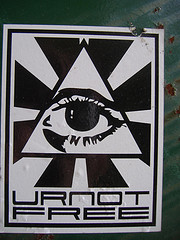 As we learn more about how brains work, traditional views can be called into question. Recent research indicates that (at least some) decision-making processes are “prepared” by the brain unconsciously several seconds before there is an awareness of having come to a decision.
As we learn more about how brains work, traditional views can be called into question. Recent research indicates that (at least some) decision-making processes are “prepared” by the brain unconsciously several seconds before there is an awareness of having come to a decision.
“In the study, participants could freely decide if they wanted to press a button with their left or right hand. … The researchers found that it was possible to predict from brain signals which option participants would take already seven seconds before they consciously made their decision.”
I was somewhat surprised by this finding, and look forward to follow-up research as well as independent confirmation. But most of my surprise was not due to the study itself, but rather how the results were interpreted as evidence against the existence of free will.
There’s more than one in-vogue argument surrounding free will. This post is not meant to address the deterministic issue (i.e. is there such a thing as choice in the universe); I intend to treat that fascinating question in a future post.
Here we are faced with evidence that the “me”/conscious/”in charge” part of us may not even be in the loop at all until after a decision is reached. Certainly big news! But something to assail free will?
For those accustomed to thinking of themselves as having free will, the implications are far more unsettling than learning about the physiological basis of other brain functions. [wired:Brain Scanners Can See Your Decisions Before You Make Them]
But since I have no control over what I think, believe, or decide, so what? … The lack of free will levels the playing field and makes all humans equal. [skepchick:Free will as illusion]
To me, there is a huge chasm between finding consciousness plays a later role in (at least some) decisions and concluding that there is no free will. Consciousness is already known to be a slippery thing, see anosognosia (my favorite), blind sight, confabulation, déjà vu. Our self-awareness gets sort of an “executive summary” of our sensory experience. Why should it be so hard to swallow the idea that the brain follows a similar pattern for decisions?
So maybe the part of me that believes it is in charge is actually more of an oversight committee. This still casts no aspersion on free will– it just gives us new data on what mental machinery is involved in making a decision. It’s still my brain, synapses wired by my experience. If we find the seat of decision-making is largely pre-conscious, we need not conclude we’re any less free, aware, or in-charge. After all, the seat of emotion was long believed to be the heart. Knowing otherwise has not sapped the vibrance from love or softened the sting of jealousy. We are still emotional creatures. And we are also decision-making creatures.
I wonder: how could we actually test for free will? You’d have to be careful that you’re not just playing to cognitive bias.
And what use then, consciousness? I’m pretty far afield of my expertise, but I could spin just-so stories all day about how an oversight, evaluating sort of self-awareness could be adaptive.
(Above photo credit: http://www.flickr.com/photos/ian_ruotsala/1491259727)
3 responses to “Hearts and minds”
I wish I was as smart as my brain!
I wonder how well their predictive ability would have worked when i bought my computer. I was all ready to buy a Mac and then was convinced otherwise. Maybe my brain knew it all along and I never really “changed my mind”.
This is a pretty simple example (choosing which button to press). I want to see them do it with a much more complex situation. The responsible thing to do NOW is to find out when you CANNOT predict what decision someone will make and then work backwards to figure out where it breaks. This way they can try to understand the differences between situations where you can predict someone’s decisions, and those when you cannot, unless you always can…
I knew you were going to say that. But only after I already decided to type this.
I’d recommend reading Daniel Dennett, especially Freedom Evolves, for a good look at the philosophical implications of this area of research as it relates to our concept of Free Will.